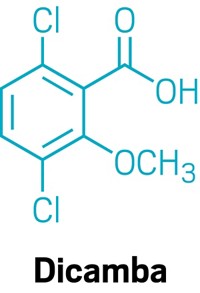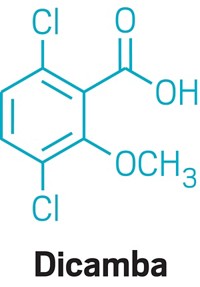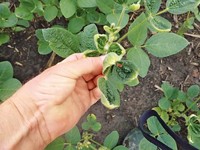Advertisement
Grab your lab coat. Let's get started
Welcome!
Welcome!
Create an account below to get 6 C&EN articles per month, receive newsletters and more - all free.
It seems this is your first time logging in online. Please enter the following information to continue.
As an ACS member you automatically get access to this site. All we need is few more details to create your reading experience.
Not you? Sign in with a different account.
Not you? Sign in with a different account.
ERROR 1
ERROR 1
ERROR 2
ERROR 2
ERROR 2
ERROR 2
ERROR 2
Password and Confirm password must match.
If you have an ACS member number, please enter it here so we can link this account to your membership. (optional)
ERROR 2
ACS values your privacy. By submitting your information, you are gaining access to C&EN and subscribing to our weekly newsletter. We use the information you provide to make your reading experience better, and we will never sell your data to third party members.
Business
Dicamba drift sows trouble in Arkansas
Reports of crop damage, despite new herbicide formulation, may result in ban
by Melody M. Bomgardner
June 21, 2017
| A version of this story appeared in
Volume 95, Issue 26

Arkansas is considering a 120-day ban on the use of dicamba herbicide on cotton and soybeans. The ban would be a response to farmers who say dicamba drifted to their fields from other farms and damaged crops.
Dicamba is used to control broadleaf weeds, including those such as Palmer amaranth that have developed resistance to the herbicide glyphosate. Herbicide-resistant weeds have become a major problem for farmers, particularly in the southern U.S.
This year, cotton and soybean farmers had the option to plant crops genetically modified to tolerate being sprayed with dicamba. The Arkansas State Plant Board approved a new dicamba formulation—BASF’s Engenia—for use during the growing season.
Engenia is an N,N-bis-(3-aminopropyl)methylamine salt of dicamba developed by BASF to reduce drift. To ensure the herbicide stays put, farmers are required to use Engenia rather than older formulations and follow detailed application instructions.
Even with those controls in place, the Arkansas plant board has received 135 complaints from farmers alleging off-target damage from dicamba across 17 counties. Confirming the cause requires investigators to go to each site to examine plant symptoms and pesticide records.
The board says it has investigated a higher-than-normal volume of dicamba-related complaints since the new crop trait became available. Reports of dicamba drift have also emerged in Mississippi, Tennessee, and Missouri.
Monsanto and DuPont have their own low-drift formulations of dicamba based on diglycolamine salts. They were not approved for use in Arkansas after April 15 but can be applied in other states during the growing season.





Join the conversation
Contact the reporter
Submit a Letter to the Editor for publication
Engage with us on Twitter